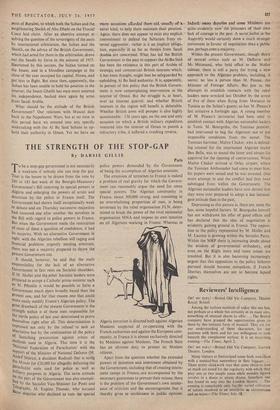THE STRENGTH OF THE STOP-GAP.
By DARSIE GILLIE Tobe a stop-gap government is not necessarily a weakness if nobody else can stop the gap. That is the lesson to be drawn from the vote by 280 to 183 last week of the Bourges-Maunoury Government's Bill renewing its special powers in Algeria and enlarging the powers of arrest and detention by the police in France itself. The Government had shown itself exceptionally weak in debate and on Thursday successive majorities had removed one after another the novelties in the Bill with regard to police powers in France. But when the Government made the restoration of most of these a question of confidence, it had its majority. With no alternative Government in Sight, with the Algerian rebellion still raging and financial problems urgently needing attention, there was not a majority prepared to throw the present Government out.
It should, however, be said that the main responsibility for the lack of an alternative Government in fact rests on Socialist shoulders. If M. Mollet and the other Socialist leaders were prepared to accept a Catholic prime minister such as M. Pflimlin it would be possible to form ,a Government much more broadly based than the Present one, and for that reason one that could More easily modify France's Algerian policy. The great drawback of the present Government is the Strength within it of those men responsible for the sterile policy of last year determined to prove themselves right after all. This determination is expressed not only by the refusal' to seek an alternative but by the continuation of the policy of launching prosecution against critics of methods used in Algeria. This time it is the 'National Federation of Parachutists' with the suPport of the Minister of National Defence (M. A, ndre 'Morice, a dissident Radical) that is suitig tne Monde for £20,000 for allegedly defaming the Parachutist units used for police as well as nlilitarY purposes in Algeria. The same attitude °tart the part of the Government was also exempli- ed by the Socialist Vice-Minister for Posts and TZlegraphs, M. Eugene Thomas, who accused ."Inse deputies who declined to vote the special Paris police powers demanded by the Government of being the accomplices of Algerian assassins.
The extension of terrorism to France is indeed a problem of real gravity for which the Govern- ment can reasonably argue' the need for some special powers. The Algerian community in France, about 300,000 strong, and consisting in an overwhelming proportion of men, is being terrorised by the rebel organisation FLN, deter- mined to break the power of the rival nationalist organisation MN A and impose its own taxation on all Algerians working in France. Whereas in Algeria terrorism is directed both against Algerian Moslems suspected of co-operating with the French authorities and against the European com- munity, in France it is almost exclusively directed by Moslems against Moslems. The French State has an obvious duty to protect its Moslem citizens.
Apart from the question whether the extended powers of detention and internment obtained by the Government, including that of creating intern- ment camps in France, are accompanied by the necessary guarantees to prevent their misuse, there is the problem of the Government's own intoler- ance of criticism and the encouragement that it thereby gives to intolerance in public opinion. Indeed,- many deputies and some Ministers are quite evidently .now the prisoners of their own lack of courage in the past. A secret ballot in the Assembly would certainly show a much stronger movement in favour of negotiation than a public one, perhaps even a majority.
Within the present Government, though shorn' of several critics such as M. Defferre •and M. Mitterand, who held office in the Mollet cabinet, there is still a party for trying a new approach to the Algerian problem, including, it seems, no less a person than M. Pineau,. the Minister of Foreign Affairs. But just as the attempts to establish contacts with the rebel leaders were wrecked last October by the arrest of five of them when flying from Morocco to Tunisia as the Sultan's guests, so has M. Pineau'g last initiative a fortnight ago. A young member of M. Pineau's secretariat had been used to establish contact with Algerian nationalist leaders in Tunis. M. Bourguiba, the Tunisian premier, had intervened to beg the Algerians not to put impossible conditions from the outset. The Tunisian barrister, Maitre Chaker, who is defend- ing counsel for the imprisoned Algerian leader Ben Bella, was to sound the latter and obtain his approval for the opening of conversations. When Maitre Chaker arrived at Orley airport, where the Tunisian Ambassador had come to meet him, his papers were seized and he was arrested. One more attempt to end the conflict had thus been sabotaged from within the Government. The Algerian nationalist leaders have now denied that they were ever prepared to adopt a less intransi- gent attitude than in the past.
Depressing as this picture is, there are, none the less, some hopeful factors. M. Bourguiba himself has not withdrawn his offer of good offices and has declared that the idea of negotiation is evidently gaining ground in France. The opposi- tion to the policy represented by M. Mollet and M. Lacoste is growing within the Socialist Party. Within the M RP there is increasing doubt about the wisdom of governmental orthodoxy, and even on the Right more and more minds are troubled. But it is also becoming increasingly urgent that this opposition to the policy hitherto pursued should become outspoken, if French• liberties themselves are not to become lapsed rights.






























 Previous page
Previous page